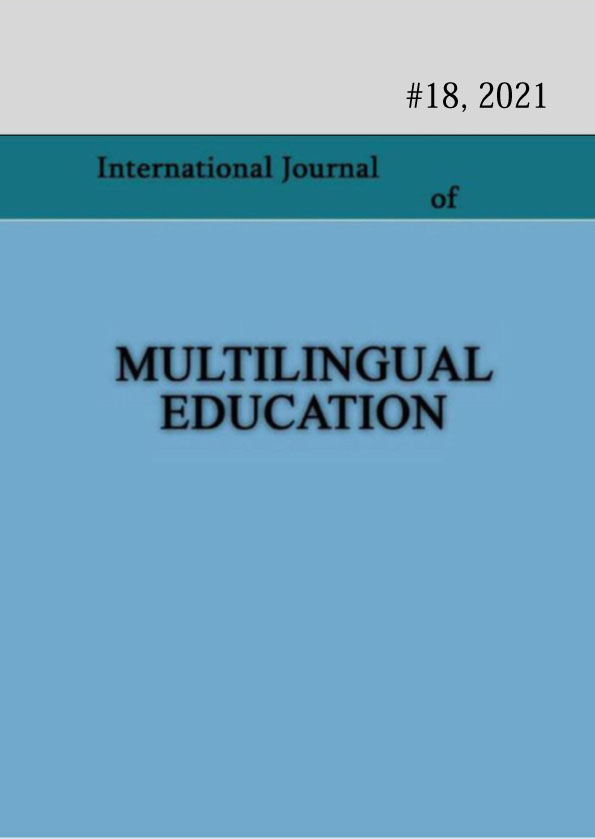Linguistic Consciousness and Foreign Language Learning in Multilingual Education
Keywords:
linguistic consciousness, foreign language teaching (FLT), multilingualism, social group, communicative competence.Abstract
The article deals with the issues where linguistic consciousness as a sociolinguistic phenomenon is successfully revealed in FLT, namely, in problematic questions of language learning. It covers the description of linguistic consciousness and some aspects of its influence on the process of development of students’ communicative competence. It is emphasized that the philosophy of lifelong learning has become a widespread phenomenon in modern society. Learning a foreign language can be considered an important means of forming linguistic consciousness and the ability to conduct intercultural dialogues. The correlation of two languages and cultures (Ukrainian and foreign ones) helps to outline their national specific features, which contribute to a deeper understanding of both the foreign and the native language and culture. Any education system is open and fairly stable. As for the methods and learning tools, they can vary depending on the applicable learning concept. The article gives a detailed description of the development of linguistic consciousness of Ukrainian students from different social groups while learning English. So linguistic consciousness is a reflection of the actual language sphere contributes to the development of both communicative and multilingual competences. The main aim of the use of modern educational technologies is to increase the level of the communicative competence and linguistic consciousness in students, their educational achievements, and to improve the quality of language education.
References
Bijeikienė at al. (2011). Bijeikienė, V., Rašinskienė, S., Zutkienė, L. Teachers’ Attitudes Towards the Use of Blended Learning in General English Classroom. KALBŲ STUDIJOS. 18 NR, 122-127.
Geben, K. (2003). Świadomość i kompetencja językowa a warstwy leksykalne w idiolektach młodzieży polskiego pochodzenia na Wileńszczyźnie. Warszawa: ELIPSA.
Hnatik, L. (2012). Movna svidomist yak obiekt doslidzhen u zakhidnoievropeiskii linhvistytsi (ohliad nimetskomovnykh prats). Ukrainske movoznavstvo, 42,73-82.
Hrynevych, L. M. (2017). Kontseptualni zasady reformuvannia zahalnoi serednoi shkoly “Nova ukrainska shkola”. Kyiv: Ministrestvo osvity i nauky Ukrainy. Access: https://www.kmu.gov.ua/storage/app/media/reforms/ukrainska-shkola-compressed.pdf.
Kriaučiūnienė, R., & Sangailaitė, V. (2016). An inquiry into the processes of lexical expansion in current English. Įteikta, metų liepos 5 d., 127-143.
Kriaučiūnienė, R., & Šiugždinienė, A. (2010). Viewpoints of intercultural competence development in English language teaching/learning classroom. Įteikta, m. lapkričio 15 d., 95-105.
Kyrychenko, A. O., & Safonova, N. A. (2020). Didgitalization of Foreign Language Teaching in Higher Educational Institutions. Teaching. Anglistics and Americanistics. Dnipro: Lira, Vol. 17, 65-73.
Lytovchenko, N. A. (2015) Multilingual Approach to Foreign Language Teaching. Anglistics and Americanistics. Dnipro: Lira, Vol. 12, 78-83.
O’Malley, J. M., & Chamot, A. U. (1990). Learning Strategies in Second Language Acquisition. Cambridge University Press, 1990.
Oxford, R. L. (1990). Language Learning Strategies: What Every Teacher Should Know. Boston: Heinle&Heinle.
Polat at al. (2003). Polat, Ye. S., Buharkin, М. Yu., Moiseiva, М. V. Novye pedagogichneskie i informatsionny tekhnologiiv systemyi obrazovania. Moskva: “Акаdemia".
Richards, J. C. (2006). Communicative Language Teaching Today. Cambridge University Press.
Saprykin, О. А. (2016). Mistse movnoi svidomosti u mizhkulturnii komunikatsii. Molodyi vchenyi. 4.1, 12-14.
Seligei, P. О. (2009). Struktura y typolohiia movnoi svidomosti. Movoznavstvo, 5, 12–29. Seligei, P. О. (2012). Movna svidomist: struktura, typolohiia, vykhovannia. Kyiv: Vydavnychyi dim “Kyievo-Mohylianska akademiia”.
Sokołowska, H. (2004) Wielojęzyczność a umiejętności komunikacyjne uczniów szkół polskich na Litwie. Warszawa: Wilno: ELIPSA.
Tsehelska M. (2014). Enchancing Foreign Language Teaching in Ukraine / Збірник I конфeренції Українського Фулбрайтівського кола. [“Будуємо нову Україну”] (Київ, 26-27 листопада 2014 р.). Київ: Видавничий дім “Києво-Могилянська академія”, 172-178.
Published
How to Cite
Issue
Section
License
Copyright (c) 2021 Nataliia Safonova, Alla Anisimova

This work is licensed under a Creative Commons Attribution-NonCommercial 4.0 International License.
Copyright (c) - Authors who publish with this journal agree to the following terms: Authors retain copyright and grant the journal the right of first publication with the work simultaneously licensed under a Creative Commons Attribution-Noncommercial 4.0 International License, which allows others to share the work with an acknowledgement of the work's authorship and initial publication in this journal. Authors are permitted and encouraged to post their work online (e.g., in institutional repositories or on their personal website) prior to and during the submission process, as it can lead to productive exchanges, as well as earlier and greater citation of published work (see The Effect of Open Access). Authors may enter into separate, additional contractual arrangements for the non-exclusive distribution of the journal's published version of the work (e.g., post it to a repository or publish it in a book), with an acknowledgement of its initial publication in this journal.

